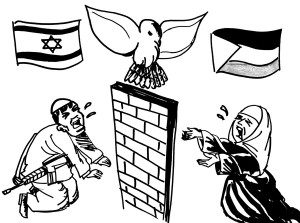Gaza cease-fire is not an adequate solution
Peace and stability have long been elusive to the people of Israel and the occupied Palestinian territories, but the most recent round of hostilities in the Holy Land has caught the eye of the international community. Many on the world stage call for a cease-fire to what has arguably been the most violent struggle in the region’s recent memory.
Both Israelis and Palestinians agreed to extend the 72-hour truce that began Aug. 10 for five additional days, according to the Guardian. This cease-fire, current as of press time, is the eighth attempt at halting fire between Israel and Hamas in Gaza. Nevertheless, what remains uncertain, is if the cease-fire will continue to hold, let alone result in any real progress.
The month-long Israeli operation in Gaza, dubbed Operation Protective Edge, has claimed the lives of approximately 2,000 people since the operation began on July 8. Of the devastating casualties, more than 1,910 Palestinians were killed — most of whom were civilians. On the Israeli sides, 64 soldiers and three civilians were killed.
The violence in Israel and Gaza, however, did not occur in a vacuum. In fact, it has been reminiscent of preceding operations between Israeli forces and Palestinian militants. The 2012 Operation Pillar of Defense claimed the lives of 180 Palestinians and six Israelis altogether. Operation Cast Lead of 2008 claimed the lives of approximately 1,400 Palestinians and 13 Israelis over the 22-day military campaign.
The cease-fire has restored temporary calm in this unstable region. It is uncertain whether the cease-fire will continue to hold, but the lesson from Operation Protective Edge and its preceding operations is clear — a cease-fire is not enough.
The recent operation was directly provoked by the kidnapping and murders of young civilians and violent Israeli Defense Forces raids in the West Bank, but the tensions between Israelis and Palestinians have been a natural repercussion of the Israeli blockade of Gaza since Israel disengaged from the strip in 2005 and the subsequent rocket fire from Hamas militants that has continually threatened Israeli civilian centers. In this nine-year period, Gaza has been on lockdown, with its heavily unemployed and densely populated civilian population confined by the Israeli buffer zone. Returning to such an unsustainable status quo would be both a foolish and irresponsible diplomatic failure for Gaza.
As Israeli and Palestinian delegations met in Cairo to resume Egyptian-brokered negotiations this past Sunday, it is imperative that leaders on both sides secure a long-term agreement beyond a temporary truce. A return to the status quo only stands to return the Palestinians of Gaza to life under strict blockade, and the Israelis to life of temporary calm and uncertainty. If Israel’s security is paramount and if the world is as overwhelmed by the death and devastation in Gaza as it says it is, a permanent diplomatic solution must be pursued.
According to J.J. Goldberg of The Jewish Daily Forward, Israel’s demands include a complete halt of rocket fire from Gaza, Israeli control over border crossings to be opened between Gaza and Israel in the framework of the agreement and for the Palestinian Authority to take control over the payment of public workers in Gaza. Hamas demands the lift of the strict blockade on Gaza, including the expansion of the coastal waters permitted by Israel for Gaza’s fishermen, a reopening of the Rafah border between Gaza and Egypt and an expansion of the goods permitted to be imported from Israel to Gaza.
Israeli Prime Minister Benjamin Netanyahu said Israel would not return to the negotiating table under fire. Just as Palestinians don’t have the luxury of declining negotiating under occupation, Israel too must accept that an end to the hostilities will come as a result of diplomatic, and not military, means. Rather than continue its chokehold on the Palestinian territories, which in turn only perpetuates resistance and gives strength to violent resistance groups like Hamas, Israel now has the opportunity to empower the more moderate Palestinian leadership of Palestinian Authority President Mahmoud Abbas and lift the strict blockade and siege of Gaza that has made life in the strip untenable.
Military and political might aside, neither the Israeli nor the Palestinian people can endure another round of violence every two to three years. In addition to a cease-fire, there needs to be justice, accountability and a responsible diplomatic solution that secures the safety and security of all civilians on both sides of the Green Line — lest we wish to see an “Operation Déjà Vu” in the near future.


